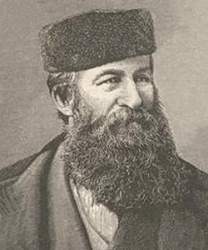Record Data
Source citation
Noah Brooks, Washington in Lincoln's Time (New York: The Century Company, 1895), 52-53.
Type
Book
Date Certainty
Exact
Transcriber
Transcription adapted from Washington in Lincoln's Time by Noah Brooks
Adapted by John Osborne, Dickinson College
Transcription date
Transcription
I recall with sadness the easy confidence and nonchalance which Hooker showed in all his conversations with the President and his little party while we were at his headquarters. The general seemed to regard the whole business of command as if it were a larger sort of picnic. He was then, by all odds, the handsomest soldier I ever laid my eyes upon. I think I see him now: tall, shapely, well dressed, though not natty in appearance; his fair red and white complexion glowing with health, his bright blue eyes sparkling with intelligence and animation, and his auburn hair tossed back upon his well-shaped head. His nose was aquiline, and the expression of his somewhat small mouth was one of much sweetness, though rather irresolute, it seemed to me. He was a gay cavalier, alert and confident, overflowing with animal spirits, and as cheery as a boy. One of his most frequent expressions when talking with the President was, "When I get to Richmond," or "After we have taken Richmond," etc. The President, noting this, said to me confidentially, and with a sigh: "That is the most depressing thing about Hooker. It seems to me that he is over-confident."
One night when Hooker and I were alone in his hut, which was partly canvas and partly logs, with a spacious fireplace and chimney, he stood in his favorite attitude with his back to the fire, aud, looking quizzically at me, said, "The President tells me that you know all about the letter he wrote to me when he put me in command of this army." I replied that Mr. Lincoln had read it to me; whereupon Hooker drew the letter from his pocket, and said, "Would n't you like to hear it again?" I told him that I should, although I had been so much impressed by its first reading that I believed I could repeat the greater part of it from memory. That letter has now become historic; then it had not been made public. As Hooker read on, he came to this sentence:
You are ambitious, which, within reasonable bounds, does good rather than harm; but I think during Burnside's command of the army you took counsel of your ambition, and thwarted him as much as you could, in which you did a great wrong to the country and to a most meritorious and honorable brother officer.
Here Hooker stopped, and vehemently said: "The President is mistaken. I never thwarted Burnside in any way, shape, or manner. Burnside was preeminently a man of deportment: he fought the battle of Fredericksburg on his deportment; he was defeated on his deportment; and he took his deportment with him out of the Army of the Potomac, thank God!" Resuming the reading of Lincoln's letter, Hooker's tone immediately softened, and he finished it almost with tears in his eyes; and as he folded it, and put it back in the breast of his coat, he said, "That is just such a letter as a father might write to his son. It is a beautiful letter, and, although I think he was harder on me than I deserved, I will say that I love the man who wrote it." Then he added, "After I have got to Richmond, I shall give that letter to you to have published." Poor Hooker, he never got to Richmond; but the letter did eventually find its way into print, and, as an epistle from the commander-in-chief of the army and navy of one of the greatest nations of the world, addressed to the newly appointed general of the magnificent army intended and expected to capture the capital of the Confederacy and to crush the rebellion, it has since become one of the famous documents of the time.




